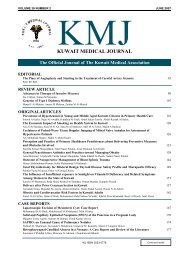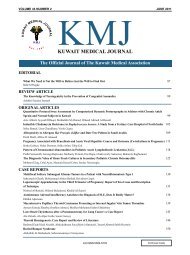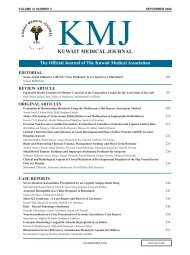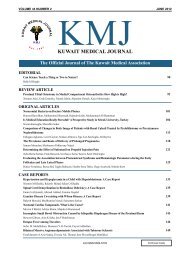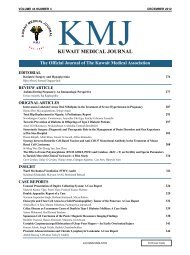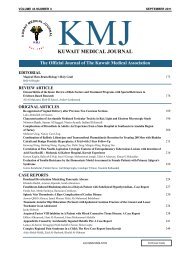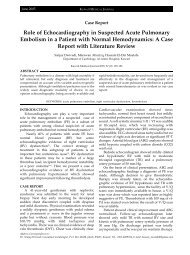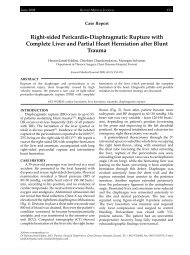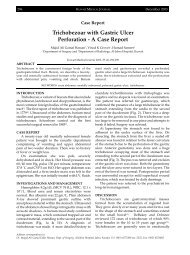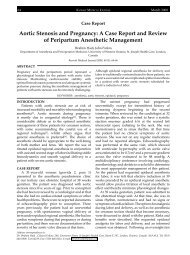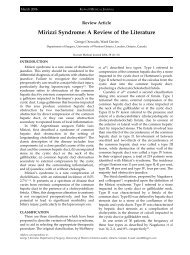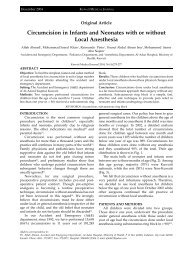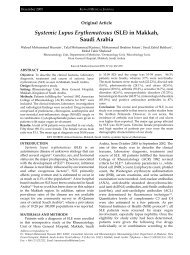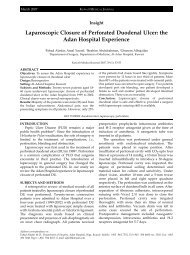June 09-41-2.indd - Kma.org.kw
June 09-41-2.indd - Kma.org.kw
June 09-41-2.indd - Kma.org.kw
Create successful ePaper yourself
Turn your PDF publications into a flip-book with our unique Google optimized e-Paper software.
<strong>June</strong> 20<strong>09</strong>KUWAIT MEDICAL JOURNAL 183With a US$ 22.5 million grant from the Bill &Melinda Gates Foundation, WHO will endeavour tocontain artemisinin resistant malaria parasites beforethey spread. Resistance along the Thai-Cambodiaborder started with chloroquine, followed by resistanceto sulfadoxine-pyrimethamine and mefloquine, drugsused in malaria control several years ago.Malaria poses a risk to half of the world’s populationand more than one million people die of the diseaseeach year. The malaria map, or the area where it isprevalent, has been reduced considerably over thepast fifty years, but the disease has defied eliminationin areas of intense transmission.Obstacles to malaria control include drug resistance inthe parasite that causes the disease, as well as resistanceof the vector mosquito to insecticides, environmentalfactors and counterfeit medicines. The likelihood ofdrug resistance is increased with the use of singledrug therapy for malaria, especially monotherapies ofartemisinin and its derivatives. Monotherapy fostersresistance because it is easier for the parasite to adaptand eventually overcome the obstacles presented bya single drug than a combination of drugs deliveredtogether. This makes it crucial for monotherapies to beremoved from the market. WHO treatment policy is totreat all cases of uncomplicated falciparum malaria withartemisinin combination therapy (ACTs).The grant will be used to meet the following keyobjectives:• Eliminate artemisinin tolerant parasites bydetecting all malaria cases in target areas andensuring effective treatment• Reduce exposure of the parasites to artemisinin tolimit emergence of resistance• Prevent transmission of artemisinin tolerantmalaria parasites through mosquito control andpersonal protection• Limit the spread of artemisinin tolerant malariaparasites by mobile populations• Support the containment and eliminationof artemisinin tolerant parasites throughcomprehensive behavior change, communication,community mobilization and advocacy• Undertake basic and operational research tofill knowledge gaps and ensure that strategiesapplied are evidence-based• Provide effective management, surveillance andcoordination to enable a rapid and high qualityimplementation of the strategy.For more information, please contact:Ravini Thenabadu, Communications Officer, GlobalMalaria Programme, WHO, Genev. Telephone:+<strong>41</strong> 22 791 2339, Mobile: +<strong>41</strong> 79 500 6549, Email:thenabadur@who.int5. CLIMATE CHANGE GLOBAL RISKS,CHALLENGES AND DECISIONSThe health impact of climate change is a criticalissue that policy makers should be aware of whilesetting priorities for action and investment to mitigatethe impact of global climate change. This was the keymessage that WHO experts delivered at the ClimateChange Global Risks, Challenges and Decisionsconference in Copenhagen. Building on research,WHO has identified three key health arguments forstronger climate change measures:1. Climate change has adverse consequences forhealth: as carbon goes up health goes downWHO and the International Panel on ClimateChange (IPCC) data identify risks to human healthas a serious signal of the consequences of climaticdisruption of this planet’s natural processes whichwe depend on for food, water, and physical safety.Health hazards from climate change are diverse,global and difficult to reverse over human time scales.They range from increased risks of extreme weatherevents, to effects on infectious disease dynamics andsea level rise leading to salinization of land and watersources.Based on WHO estimates around 150,000 deathsnow occur in low-income countries each year dueto climate change from four climate-sensitive healthoutcomes – crop failure and malnutrition, diarrhealdisease, malaria and flooding. Almost 85% of theseexcess deaths are in young children.2. Reducing green house gases emissions can bebeneficial to health: as carbon goes down healthgoes upFeasible improvements in environmental conditionscould reduce the global disease burden by more than25%. A large part of the current burden is linked toenergy consumption and transport systems. Changingthese systems to reduce climate change would have theadded benefit of addressing some major public healthissues, including outdoor air pollution (800 000 annualglobal deaths); traffic accidents (1.2 million annualdeaths); physical inactivity (1.9 million deaths); andindoor air pollution (1.5 million annual deaths).3. The health impacts of climate change are feltunequally: effective response requires global actionWhether it’s the 70,000 excess deaths from the heatwave in Europe in 2003, or new malarial deaths in thecentral African highlands, the people at greatest riskfor climate-related health disorders and prematuredeaths are the poor, the geographically vulnerable, thevery young, women and the elderly. The populationsconsidered to be at greatest risk are those living in



